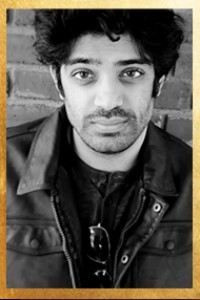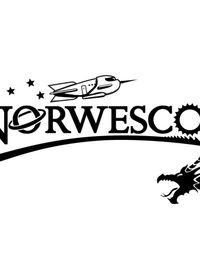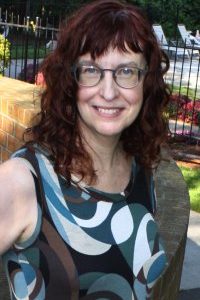Ellen Klages: Magic in the Mix
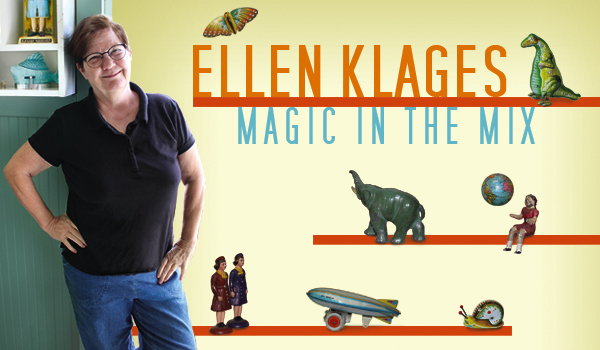
Ellen Janeway Klages was born July 9, 1954 in Columbus OH. She attended the University of California at Berkeley in 1972, but dropped out in her sophomore year, spent time as a camp counselor and working at a book factory, then returned to college, graduating from the University of Michigan in 1976 with a philosophy degree. She worked at a pinball arcade and as a photographer before moving onto various jobs related to printing and publishing. ‘‘P’’ turned out to be a good letter. She spent four years working as the self-proclaimed ‘‘minister of propaganda’’ for Harbin Hot Springs resort in Northern California, and wrote its history: Harbin Hot Springs: Healing Waters, Sacred Land (1991). In 1992 she began working part time as a proofreader for the Exploratorium, an interactive science museum in San Francisco. She later began writing for the museum, collaborating with Pat Murphy and others on a series of science books for kids: The Science Explorer (1996), The Science Explorer Out and About (1997), and The Brain Explorer (1999). She also wrote the science activity book Exploratorium: A Year of Discoveries (1997).
Klages has published many highly regarded works of short fiction, beginning with Nebula and Hugo finalist ‘‘Time Gypsy’’ (1999). Other stories include Nebula nominee ‘‘Flying Over Water,’’ Nebula winner ‘‘Basement Magic’’ (2003), ‘‘The Green Glass Sea’’ (2004), ‘‘In the House of the Seven Librarians’’ (2006), and World Fantasy Award finalist ‘‘Singing on a Star’’ (2009). Novella ‘‘Wakulla Springs’’, with Andy Duncan, (2013) was a Hugo and Nebula Award finalist and won the World Fantasy award. Her new novella Passing Strange (2017) is a historical fantasy set in 1940s San Francisco. Her short fiction has been collected in World Fantasy Award nominee Portable Childhoods (2007) and Wicked Wonders (2017). First novel The Green Glass Sea (2006) is about the Manhattan Project, and won the Scott O’Dell Award for best young adult historical fiction. Sequel White Sands, Red Menace appeared in 2010, and a third volume in the series, Out of Left Field is forthcoming in 2018.
Klages was a finalist for the Campbell Award for Best New Writer in 2000. She served for many years on the Motherboard for the James Tiptree, Jr. Award (retiring in 2015), and used her considerable improv and comedy skills as the host of the annual Tiptree auction until 2013. She lives in San Francisco.
Excerpts from the interview:
‘‘On the cover of The Green Glass Sea, it says ‘Ages nine and up.’ The up that I know of is 96. It was marketed not even as YA, but as middle grade. The funny thing is, when I wrote the story ‘The Green Glass Sea’ for Strange Horizons in 2003, I didn’t write it any differently than I write for adults. My now-former agent turned the book down even though I had an editor, Sharyn November, who wanted it, saying, ‘It’s too sophisticated for children and too simple for adults, so I don’t think there’s a market for it.’ I didn’t write it as a middle grade or a YA – I just wrote it. It’s no different than anything else I write. Which means that I was not talking down to children, because I never actually thought children were my readers. But all of a sudden, I’m a middle-grade author. I won the Scott O’Dell Award for historical fiction, which was amazing, a big national award, and suddenly I had all this attention. Now I go to speak to classes of fourth and fifth and sixth graders. The book has been out for almost 11 years, so the kids who were nine then are in college, and somewhere out there, even as we speak, someone’s making a kid who’s going to be nine in nine years. Whereas for adult books, it comes out, the people who read it read it, maybe it gets word of mouth and lasts a couple of years. But there’s a new crop of nine-year-olds every year.”
…
‘‘My novella with Andy Duncan, ‘Wakulla Springs’, came out in 2013. We started writing it in 2003, the year I turned in The Green Glass Sea. ‘Started writing’ is a euphemism. I had this idea. I’d read an article about somebody interviewing a chimp in a trailer park in LA. The chimp was dressed in a white shirt, suspenders, and old man pants, and he was smoking a cigar and drinking whiskey. He was supposedly the chimp who had been Cheetah in the 1933 Tarzan movies, and he was the oldest chimp ever – he was 50-something, living in a trailer park. It was an article in The National Enquirer, and I clipped it out and put it in a folder, and thought, ‘There’s a story there.’ I saw something in Reader’s Digest about non-native species in Florida, because petting zoos and circuses and things like that would just let the animals go when they went bankrupt. There’s a population of monkeys somewhere in Florida, like 200 or 300 of them, and there are flocks of wild parrots, and now boa constrictors. I put that in the same folder with the Tarzan things. When they made the movies in the ’30s, they’d just set the animals free when the movie was over, thinking ‘one jungle’s the same as another.’ So 20 years ago, I had this folder full of ideas about Cheetah and Tarzan movies and non-native species in Florida, and every once in a while I would find another article, clip it out and put it in this folder. One night, sometime around 2002 or so, I was thinking, ‘This is an Andy Duncan story. It’s set in the deep South, which Andy does so well.’ I have no idea how Andy Duncan writes a story. He’s brilliant. I’ve read his stories. I still have no idea how he does it.
‘‘Andy and I were at the International Conference on the Fantastic in the Arts, I think in 2003, in Ft. Lauderdale, in a hotel that was slowly disintegrating into mildew, and I came up to Andy and said, ‘I have a story idea, let me pitch it and I’ll buy you a beer.’ He said, ‘I’m not working on an anthology or anything.’ I said, ‘I know. I have this idea and I think it’s an Andy Duncan story.’ I bought Andy a beer, and told him about my folder and what was in it. After an hour or so – and another beer – he said, ‘Maybe we should write it together. And maybe with both our names on it, we might even be able to sell it.’”
…
‘‘I wrote Passing Strange because Jonathan Strahan came to me and said, ‘I’m acquiring for Tor.com’s new novella line. Do you want to write one?’ I said, ‘I literally have not written anything in about two years.’ I had three stories that came out in 2014, but I had written them before my back went out. Still, I said ‘Sure,’ because I kind of needed a reason to live, and I didn’t want to disappear from the SF world without a trace. In 2014, my name and Andy’s name were on everybody’s list of everything for the year – it wasn’t like anybody was going to forget about us that year. But karma has no shelf life.
‘‘Jonathan said, ‘I need a proposal.’ I said, ‘What do you mean? It’s a short story. You want me to know what the story’s about before I write it?’ I don’t do that. I get ideas, but they’re just inklings that may or may not pan out as the story emerges. But I made up a proposal. I didn’t know if I could write. I didn’t even know if I could sit, much less type and think and have a brain. It was a risk. I didn’t know if I was going to be able to finish it, and I didn’t know if I did finish it, if I was gonna be writing to the best of my ability. But I said yes anyway.”
…
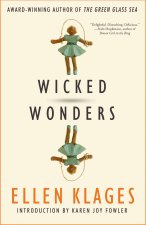 ‘‘My new collection is called Wicked Wonders, and it’s nearly all of the short fiction I’ve written in the past decade, except for ‘Wakulla Springs’. Fourteen stories. One of them is ‘The Scary Ham’, which is non-fiction, and was a speech at the Nebulas in 2014, and then became a movie, and for a while I was thinking it was the thing I’d be most known for. There’s a previously unpublished story. The book has an introduction by Karen Joy Fowler, which is such an honor.
‘‘My new collection is called Wicked Wonders, and it’s nearly all of the short fiction I’ve written in the past decade, except for ‘Wakulla Springs’. Fourteen stories. One of them is ‘The Scary Ham’, which is non-fiction, and was a speech at the Nebulas in 2014, and then became a movie, and for a while I was thinking it was the thing I’d be most known for. There’s a previously unpublished story. The book has an introduction by Karen Joy Fowler, which is such an honor.
‘‘I’m excited about it. Some stories have been reprinted a couple of times, but there are others that I really love which, in the way of short stories, came out and then disappeared. A brand-new one, ‘Woodsmoke’, is appearing there for the first time. I wrote it in 2012 for a Sharyn November Firebirds anthology that Viking decided not to do. There’s another story that is now called ‘Gone to the Library’ that came out in Eclipse Three. I had never been completely satisfied with the ending, and Jacob Weisman at Tachyon asked if I could rewrite it because he didn’t like the ending, either. It’s essentially the same story, rewritten, which I’ve never done before. The rest of the stories are as originally published.”
…
‘‘I love short stories. Imagine holding a small carved bowl, its weight and shape and size a perfect fit for two cupped hands. The grain of the wood flows with the bowl’s curves. The interplay of light and dark pleases the eye. The texture is silken against your skin. You turn it, admiring the craft, the artistry, and the detail. ‘It’s lovely,’ you say, handing it back to its creator. Then you say, ‘Now when are you going to make something real, like furniture?’ Now imagine the bowl is a short story. Why do so many readers and writers consider short stories to be some sort of training wheels? As if writing a short story is just a way of wobbling around until you find your balance, and are ready for the big-girl bike of a novel? Sigh. For many years I swore up and down I would never write a novel, because I do so love short stories. There was something about maintaining my sense of artistic purity or something. Then I wrote The Green Glass Sea. The story ‘The Green Glass Sea’ is the last chapter of the novel The Green Glass Sea. I can’t claim any sort of moral high ground for never writing a novel because I’ve written three of them now.”
Read the complete interview in the May 2017 issue of Locus Magazine. Interview design by Francesca Myman, author photo by Liza Groen Trombi.



